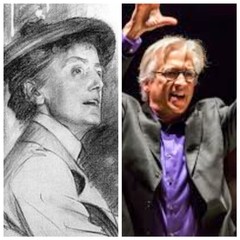|
Back
The Spirits Were Spirited New York
Isaac Stern Auditorium, Carnegie Hall
05/11/2018 -
Dame Ethel Smyth: The Prison
Wolfgang Amadeus Mozart: Requiem, K. 626
Danielle Beckvermit, Chelsea Shephard (Sopranos), Kathleen Reveille (Mezzo-soprano), John Chongyoon Noh (Tenor), Tobias Greenhalgh (Baritone), Paul Whelan (Bass-baritone)
The Cecilia Chorus of New York with Orchestra, Mark Shapiro (Music Director and Conductor)

John Singer Sargent’s Dame E. Smyth/M. Shapiro
The usual lauds for The Cecilia Chorus are twofold. First, as they showed last night, they are a terrific group. And under Mark Shapiro, their voices are transparent, they can give off some ear-splitting fortissimos without an iota of blatancy, and they are...well, sometimes ravishing.
The second laud goes to their chutzpa. Or, to the church-going, their audacity. Yes, Cecilia does its Messiah and Elijah. But they commission some extraordinary works like Tom Cipullo’s Credo for a Secular City, and they have premiered older works by Salieri and Fanny Mendelssohn.
Or, like last night Dame Ethel Smyth’s The Prison, just a few years after premiering her Mass.
And herein lay the paradox. First, personally, Ethel Smyth was one helluva Dame! Her 86 years, spent much in Germany making the friendship of Brahms, Tchaikovsky etc. was one facet. She was a true Suffragette, spending time in prison without regret. She was a lesbian at a time when male homosexuality was a crime (Queen Victoria never believed that ladies were...er...“that way.”)
She wrote extensively, her ideas were progressive, and her voice...Well, I YouTubed her description of Brahms, and her elite plumminess would make Queen Elizabeth II sound like a fish-monger!
As to her composition, the only relevant thing here, she was original, she was never lured to be a Wagnerian or Brahmsian, and from last night’s production, she was a true original.
Up to a point. First, she never figuredThe Prison to be a Mahler-style symphony, using that word only as a concordance of sounds. Nor was it an oratorio (far too religious for this free-thinker). But yes, it did sound–far too much–like an Edwardian Elgarian cantata.
Its 1930 composition was an anachronism, though not a fatal one. The libretto was one of those typical syncretisms of the 1890’s Mystic, transcendent, a mixture of Wordsworthian/Theosophical immortality, a hint of Mallarmé (“I am as a dooméd ship...”), a few personal references (the Last Post cornet call in honor of her military family), and the metaphysical comforts which Mahler and Elgar and done so well 40 years before).
In fact, a terrible thought crossed my mind. The program notes by Elizabeth Wood had been all encompassing, offering the explanations of Greek and archaic intimations. Add to that the exotic musical spices of solos on one note, of bird-twittering, of ancient melodies.
And yet one still came out of it eating a musical roast beef and Yorkshire pudding.
Big gallumphing choruses, Handelian grandeur, splendid quasi-lyrical solos (both “prisoner” Tobias Greenhalgh and his “soul”, soprano Chelsea Shephard were excellent), and the farewell military call-to-arms (a bugle simulation played magnificently by Kate Amrine). All were worthy of respect, all was conducted with passion and joy by Maestro Shapiro.
Still at the end, when Mr. Greenhalgh sung “I am not even going home” and the chorus repeated it, I hopelessly tried to ignore the metaphor and hoped that after an hour, he would go home.
It was a noble effort, a dynamic execution, the audience roared its appreciation. But to these agnostical ears, Dame Ethel Smyth’s piece was a sumptuous curiosity, a Dickensian buffet table of the commonplace and the exotic.
That obviously could not be said for Mozart’s Requiem. The Cecilia Chorus peformed with their usual immaculate stead. But in using the Robert Levin re-composition of Süssmayr’s completion, the orchestra was more transparent (Levin removed some of the heavy-handed wind-doublings), yet he was not afraid to augment the strings with a few melodic flights.
At its best, during the Lachrymosa, the chorus was ethereal, yet leaving suddenly for a short fugue on “Amen.”
Cecilia Chorus handled it all with excitement, passion and (to rhyme with Dame Ethel’s family name “litheness”

C. Shephard/J. C. Noh (© Courtesy of the Artist/Cecilia Chorus)
The four soloists were certainly up to the tasks, with tenor John Chungyoon Noh and Chelsea Shephard gorgeous both in ensemble and solos.
And no, listening to the Mozart did not degrade Dame Ethel’s work at all. They were of different eras and different beliefs and different dispositions. For us, the Mozart is eternal. The Prison was a grandiloquent rarity, whose ersatz-soaring spirited otherworldliness was easily topped by an original musical spirit.
Harry Rolnick
|